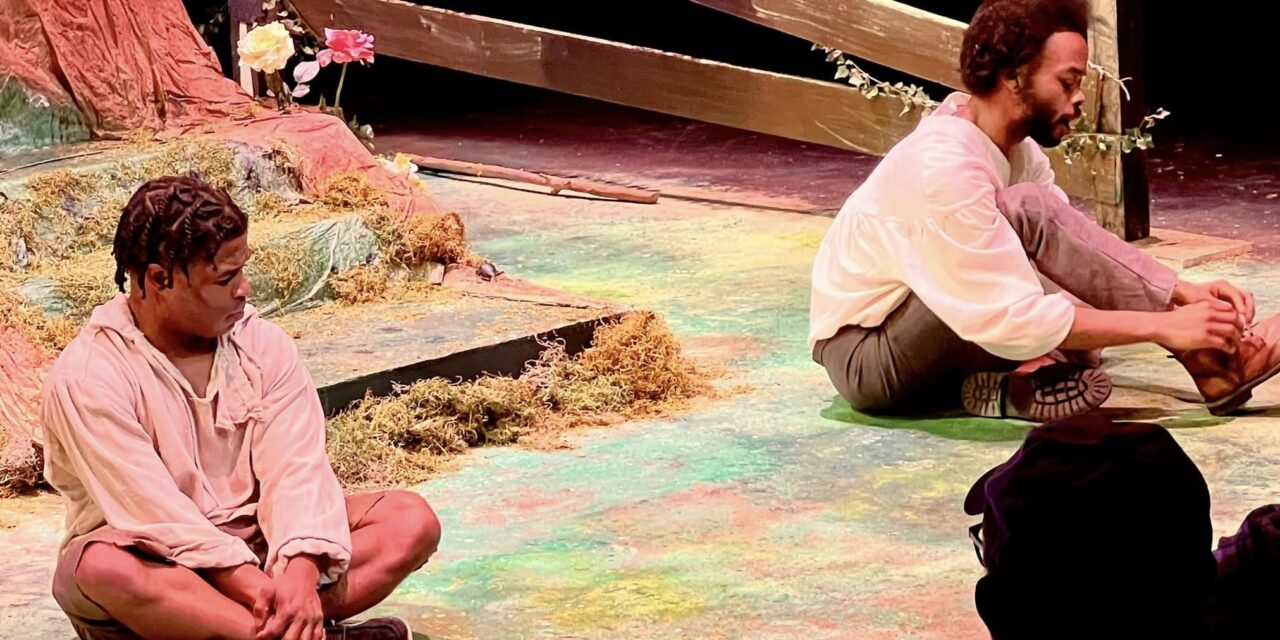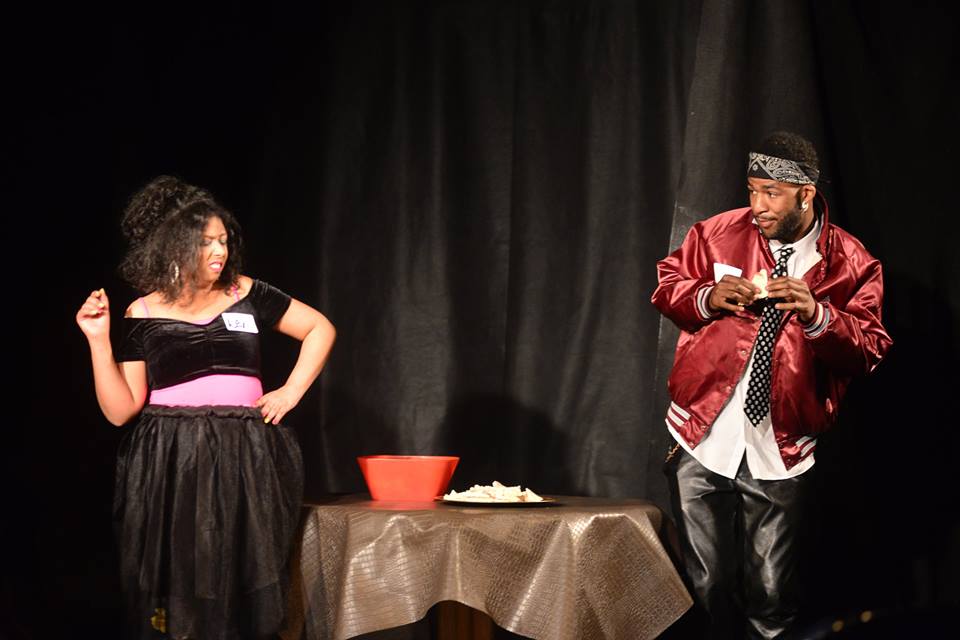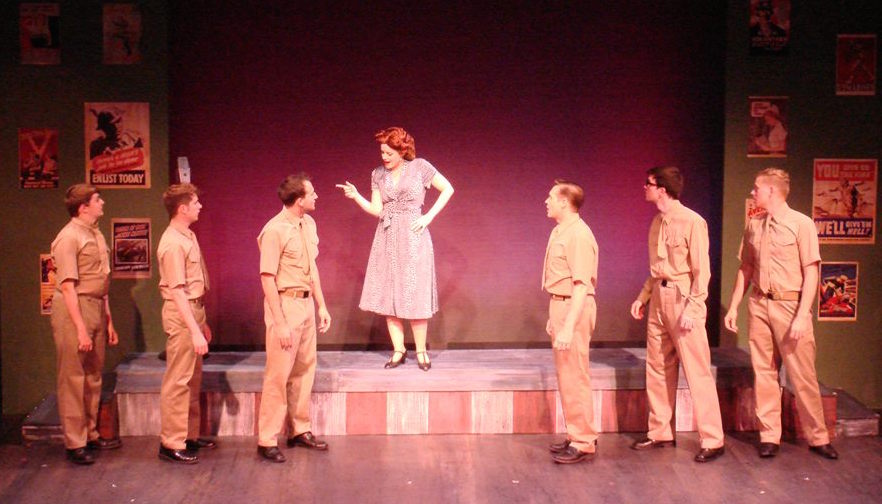Lawrence Robertson & Isaiah Archie in Sugar in Our Wounds. Photo: Tyler Tate
Sugar in Our Wounds
By Donja R. Love
Directed by Tyler Tate
A review by Tory Parker
Entire contents are copyright © 2024 by Tory Parker. All rights reserved.
I’ll admit that I was surprised when I first read the premise of Pandora Production’s January 2024 show in the season announcement. The story of two young, enslaved men falling in love on a deep-South plantation in 1862 has all the potential to be heavy and cathartic at its best and deeply traumatizing at its worst. But I was also intrigued by playwright Donja R. Love’s idea for a trilogy exploring queer love at pivotal moments in Black history. (The second and third installments take place during Civil Rights and the beginning of the Black Lives Matter movement.) The truth that queer love has existed and persisted throughout every moment of human history is crucial, as powerful groups and governments across the world and in our own backyards try (and fail) to erase queer people entirely.
Sugar in Our Wounds is, as it sets out to be, a deeply moving story. The danger these characters exist within and the stakes surrounding their choices are never allowed to be forgotten. And if it’s tears and heartache the playwright is going for, it is what he gets. There are many moments, however, when that feels like it was ALL he was going for, more than a sense of truth about the actuality of history, or any sort of meaningful evolution within his characters.
It is clear that director Tyler Tate, however, has great care for these characters and their story. You can witness his handiwork in carefully constructed movement pieces and tender confessional moments between characters throughout. But even helmed by a director as fearless as Tate, this script is daunting. The dialogue is heavily stylized, at times poetic and mysterious, but at other times jarring, juxtaposed with 2018 sentiments. The intimacy spans the gamut of tender and sweet to sexual to sickeningly violent. And the relationships between everyone on stage are layered, complicated by all the power they have to hurt each other.
At times, you could feel that anxiety in the cast. Particularly unsavory moments, designed and written to make the audience feel uncomfortable in one way, often left us instead feeling uncomfortable in solidarity with the performers. There was a sense that, at times, they too wanted this scene to be done, this moment to be passed, this line to be gotten through.
But, like her character, Aunt Mama, Debra Chandler-Reid shows no fear in the face of a role that holds the story together. Aunt Mama, no one’s aunt or mama, is “probably older than God” and grounds her mismatched family in the memory and magic she carries from her ancestors. In the same way, Chandler-Reid is the lighthouse through which the cast finds their way into these characters, and in her radiance, they don’t appear to be as shallow as we feared.
Lawrence Robertson gives us a James who is childlike and naive, with such sweet and simple joy that your heart aches for him from the very beginning. You know that in a world this cruel, in a system this inhumane, nothing as gold as James can stay. Robertson has tender chemistry with Isaiah Archie as Henry, who has recently been ripped from his family and sold to the plantation as a form of punishment. Archie’s lythe restlessness is different from Robertson’s zest, but they complement each other nicely, and it is easy, if terrifying, to watch their characters fall in love.
Through Mattie, played by Cicily Bullard, and Isabel, played by Rayann Houghlin Walker, we face the monster of sexual violence that was a reality for so many enslaved people. The two are sisters, fathered by the Master of the plantation. And while they once played together as children, as young women, one lives under the threat of his constant physical/sexual assault, and one lives under his protection in the Big House. Both Bullard and Walker play these characters with unironic, wide-eyed innocence, which leaves the audience rather rudderless when they make distinct turns into the illicit or grotesque. I found myself wanting more from them–grit or poison, malice or deep loneliness–something to complicate rather than explain.
Like all meaningful stories of star-crossed lovers, this play is rife with prophecies and magic, unexplainable but nonetheless familiar notions of blood, music, earth, and roots that tie us to our history and each other. It’s a lush playing field for a love story, and Sugar in Our Wounds is strongest when it leans into the unknowable and embraces itself as a fable. Love grows out of everything, can be found anywhere, and belongs to everyone. Love is carried through blood, sung through song, told through myth and legend, and seeps into the ground we call home.
Featuring Isaiah Archie, Cicily Bullard, Debra Chandler-Reid, Lawrence Robertson, and Rayann Houghlin Walker.
Sugar in Our Wounds
January 5 – 21, 2024
Pandora Productions
Henry Clay Theater
604 S. 3rd Street
Louisville, KY 40202
pandoraprods.org
Tory Parker, originally from West Virginia, is now a proud Kentuckian as well. In Louisville, she’s worked and/or performed with Actors Theatre of Louisville, Claddagh Theatre Company, the Chamber Theatre, Bellarmine University, Wayward Actors Company, Derby City Playwrights, Company OutCast, SHOTZ, Highview Arts Center, and director Emily Grimany. She is a co-founding artist of the queer theatre collaborative, three witches shakespeare, and of Untitled Louisville Theatre Company. As a playwright, her full-length drama, Recommended for You, appears in Stage It and Stream It: Plays for Virtual Theatre, and her original works have appeared in the National Women’s Theatre Festival Fringe Festival.





